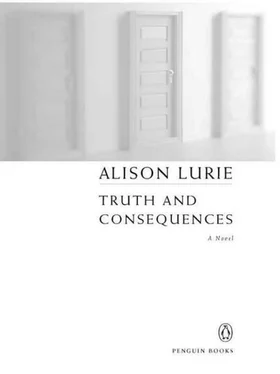When Jane had returned to the house without notice late Sunday afternoon, Alan had just burnt both his dinner and his hand by punching in BAKED POTATO instead of WARM on the microwave. Jane had instantly expressed concern and filled a saucepan with cold water and ice cubes, her old standard remedy. As Alan sat at the kitchen table with his hand in the pan of ice water, he had felt a rush of gratitude, even of affection.
“Thank you, that feels a lot better,” he told her. And then, after a pause, “Look, I really regret what happened Friday.”
“Yes?” Jane’s stiff, neutral expression slowly began to soften.
“I—” He opened his mouth to tell her that he was very sorry, but in fact he was involved with, maybe even in love with, Delia Delaney. The best thing you can do, always, is tell the truth and take the consequences , his father used to say. But Alan did not do this now, partly because Jane already looked so beaten-down and miserable. He also did not do it because it would cause Delia to regard him with scorn. “It was natural for you to get upset,” he said instead. “I know it looked suspicious, but honestly nothing was going on. Delia was having a migraine, and I was just trying to give her some comfort, some sympathy—You know I’m in no shape to—” He swallowed the half lie.
Jane stared at him, her mouth trembling. “I don’t believe you,” she said finally. “Nobody could believe you. You don’t have to take off your clothes to sympathize with somebody. And nobody hides behind a curtain unless they’re involved in some hanky-panky,” she added, in her mother’s phrase and almost her mother’s intonation. “It’s all dirty lies, and I bet you didn’t even think of them yourself. That horrible woman put you up to it.”
“Really, Jane,” Alan said, trying to speak in a cool and reasonable manner.
“She’s using you, just like she uses everybody. She doesn’t care for you or anyone but herself, and you’ll find that out soon, unless you’re too stupid. Oh, the hell with it all.” Jane burst into tears; then she turned away and rushed upstairs. When she returned, dragging a carry-on suitcase, she would not even speak, only left, slamming the back door.
“Jane’s staying with her parents downtown, and she won’t speak to me,” he had told Delia on Monday morning.
“Acting out all the old clichés,” Delia had said with a slight, scornful laugh.
“How do you mean?”
“Giving you the silent treatment. Gone home to Mother.”
“So where should she have gone?”
“Jesus, I don’t know.” Delia sighed, almost yawned. “New York, Paris? But some people have no imagination.”
That’s true, he thought. But it’s not their fault; and if Jane had really gone to New York or Paris there would be confusion and scandal.
“And now you’re supposed to admit your guilt and beg forgiveness, isn’t that right?”
“You think that’s what I should do?” asked Alan, who had again been considering this move.
“Not if you want any respect at home from now on,” Delia told him. “If you wait a while, she’ll come around.”
It was Wednesday now, and Jane had not come around in either sense of the phrase. She had been at the Center every afternoon, but had made no attempt to speak to him there, though every day a plate containing that evening’s supper, wrapped in transparent plastic, had appeared in his fridge. Meanwhile, incredibly rapidly, everything at home had begun to fall apart. The cleaning lady wouldn’t come until Friday, and the house was already a mess, littered with discarded papers and dirty dishes. The flowers had died in the vases, and Alan couldn’t find the can opener. Yesterday he had spilled a plate of creamed chicken and waffles into his recliner, and though he had done his best to mop it up, the leather was now sticky and smelly. When he went to the supermarket with his student driver he had forgotten to buy bread or milk for his morning cereal, and he was out of clean underwear and socks.
As he reached the entrance to the lecture hall, Alan was surprised to see in the crowd his back-pain pal Bernie Kotelchuk, the retired professor of veterinary medicine, accompanied by his wife Danielle, a retired professor of French.
“You going to the lecture?” he asked.
“Uh-huh.” Bernie grinned.
“You’re interested in ‘William James and Religious Experience ?’ ” Traditionally, the annual Unger Lecture was coordinated with that year’s Unger Center theme.
“Nah, not really. But Zimmern is Danielle’s ex-husband.”
“Really.” Alan had been more or less unaware that Danielle had an ex-husband; she seemed so well suited to her current one.
“I wouldn’t miss it for anything,” said Danielle. Like Bernie, she was ruddy, cheerful, and sturdy. She wore her thick gray hair in a ponytail tied with red and brown yarn, and was wrapped in several layers of hand-knit red and brown sweaters and scarves rather than a coat.
“You know, most women would do anything to avoid having to listen to their ex,” Alan said.
“Not me.” Danielle smiled. “I’m not angry at Lennie anymore, it’s been too long. Anyhow the kids will expect me to give them a report.” She moved ahead, toward the double doors.
“So how are you doing?” Bernie asked as they followed.
“Oh, okay,” Alan replied, and saw Bernie register the true meaning of this answer according to their unspoken code, perhaps that of all invalids: Not so good, actually . “How about you?”
“Not too bad,” Bernie said, meaning, Better, actually . “I’m driving again, you know.”
“Yeah? That’s great.”
“It’s all because of this doohickey.” Bernie held up a large brown canvas carrying case. “Changed my life.”
“A briefcase changed your life?”
“Yep,” Bernie asserted. “Well, nah. It’s what’s inside. Feel it, see if you can guess.” Alan touched the briefcase and encountered a thick, flat, curved piece of hard material, probably wood. It was familiar somehow, but he could not identify it, and shook his head.
“It’s a toilet seat,” Bernie confided. “This exercise guy at the Y—you know, the one with the red hair and the Star Trek T-shirt—he put me on to it last week. You go to Sears, he said, buy yourself one of these. Take it apart, throw away the lid. Get a bag for the bottom piece. This here, it looks like a briefcase, right? Hell, it is a briefcase. Nobody can tell what’s inside. I take it everywhere. All of a sudden, no extra pain when I sit. Danielle doesn’t have to drive me anywhere. I can go to the drugstore, work at my desk, drive to school to check on the dog project. Fly on planes, go to conferences, anything I want.” He laughed.
In the past, before the lizard moved into his back, nothing on earth would have persuaded Alan to carry around a toilet seat in a canvas bag. But Jane had left him; he was eating scorched or soggy microwaved meals and depending on unreliable student drivers. “You think it would work for me?”
“Could be. Wanna try it?”
Together, Alan and the Kotelchuks moved toward the rear of the room. Bernie placed the briefcase on a seat, and Alan lowered himself onto it cautiously. Usually he could hardly bear to sit on a hard surface for more than a few minutes. But now the pain did not increase ; it even seemed to moderate slightly.
“Yeah, that’s better,” he conceded, standing up out of the way so that Bernie could sit down. Over the past year or so, several people, including Jane, had suggested that he should obtain and carry about with him an inflatable rubber ring of the type used by sufferers from hemorrhoids, or women after a painful childbirth. Alan, whose horror of seeming ridiculous had not diminished, had always refused. But a briefcase—yes, that might be possible, as long as nobody knew what was inside it.
Читать дальше







![Кэмерон Доки - Правда и ее последствия[Truth and Consequences]](/books/79610/kemeron-doki-pravda-i-ee-posledstviya-truth-and-con-thumb.webp)




